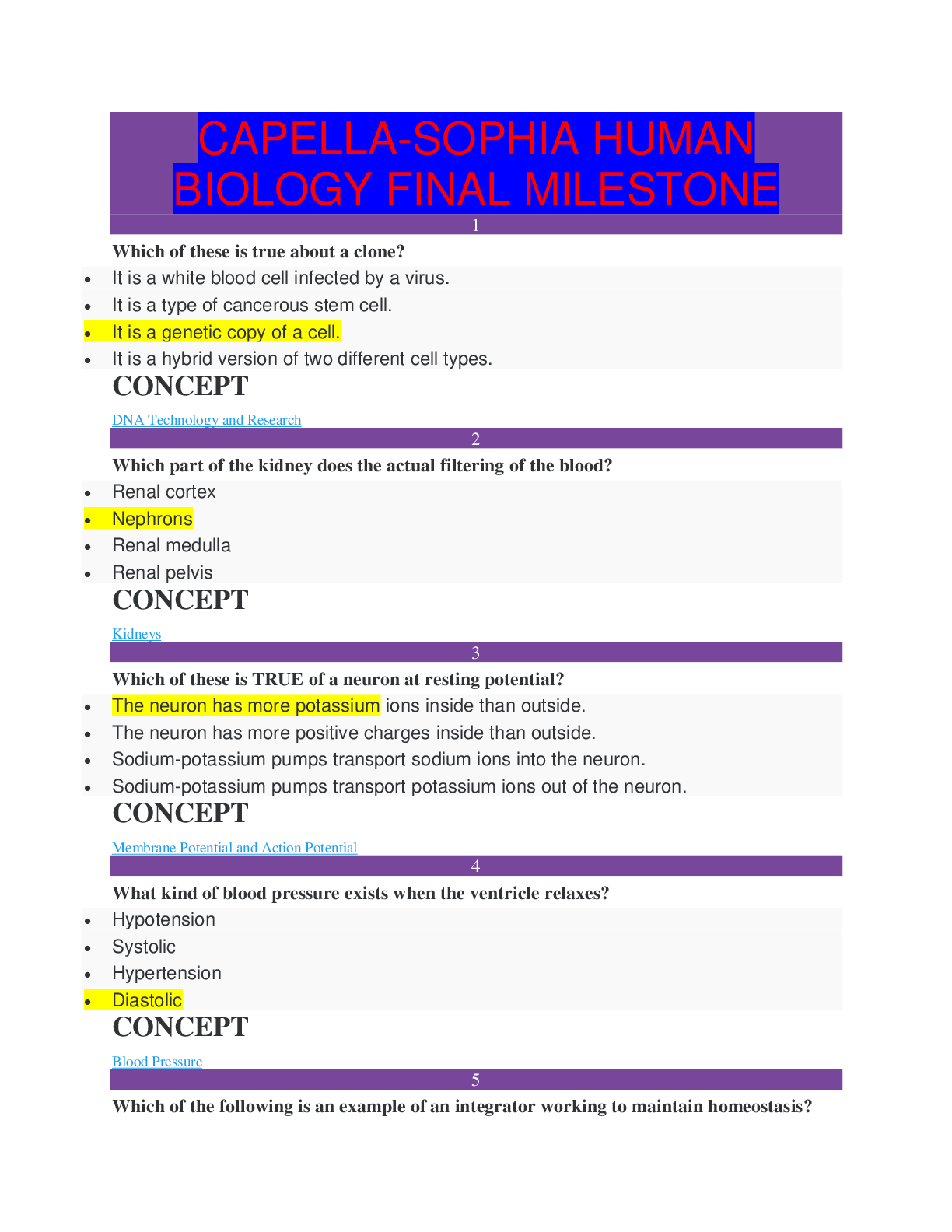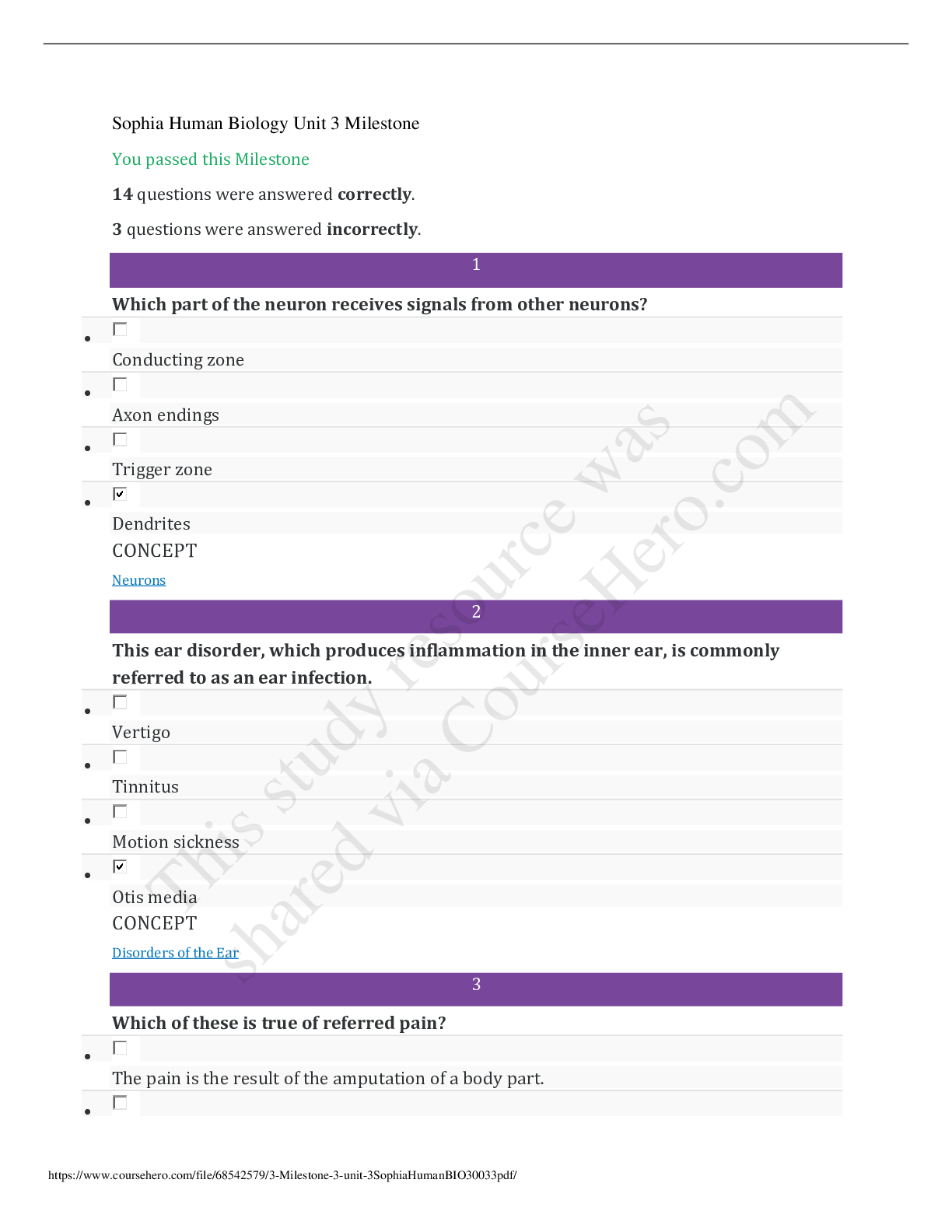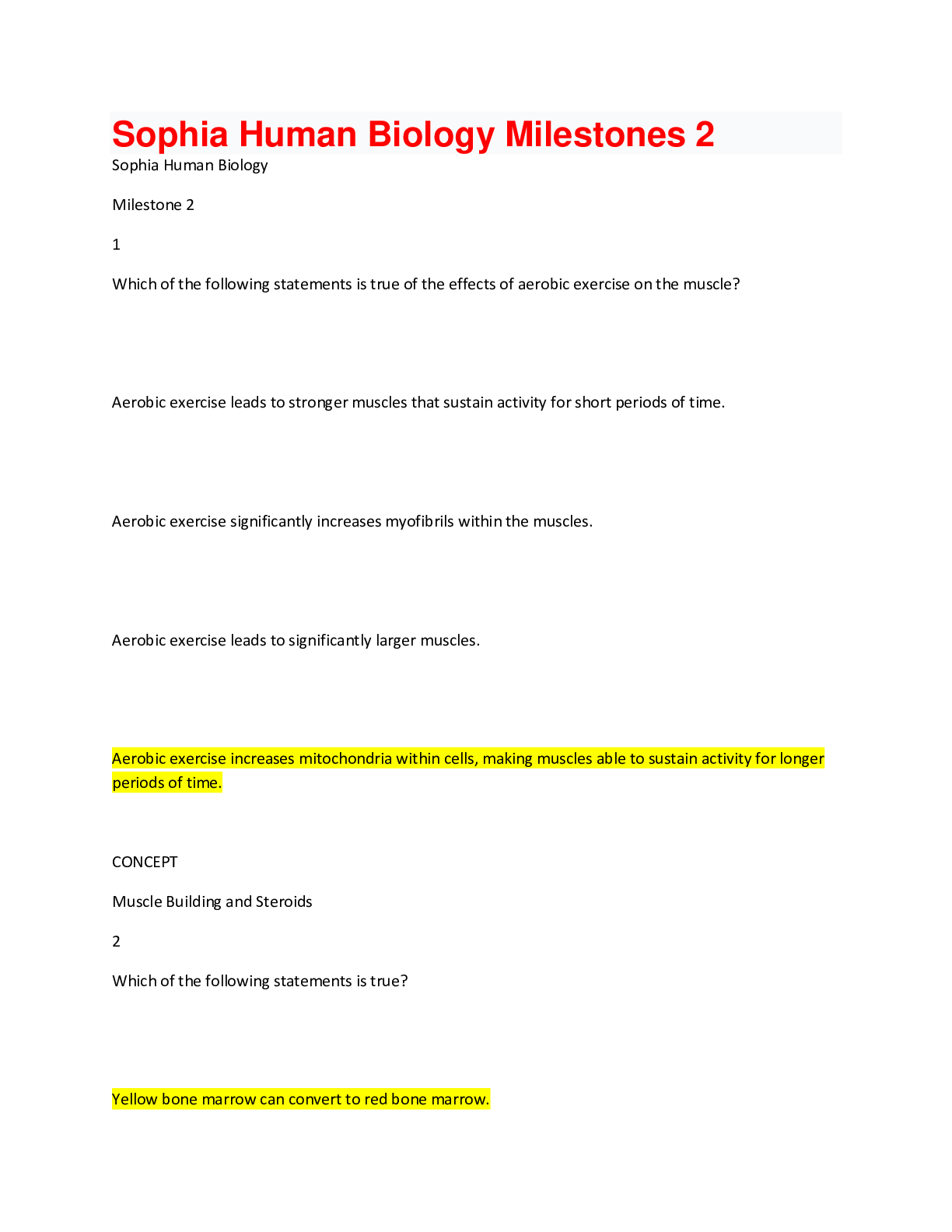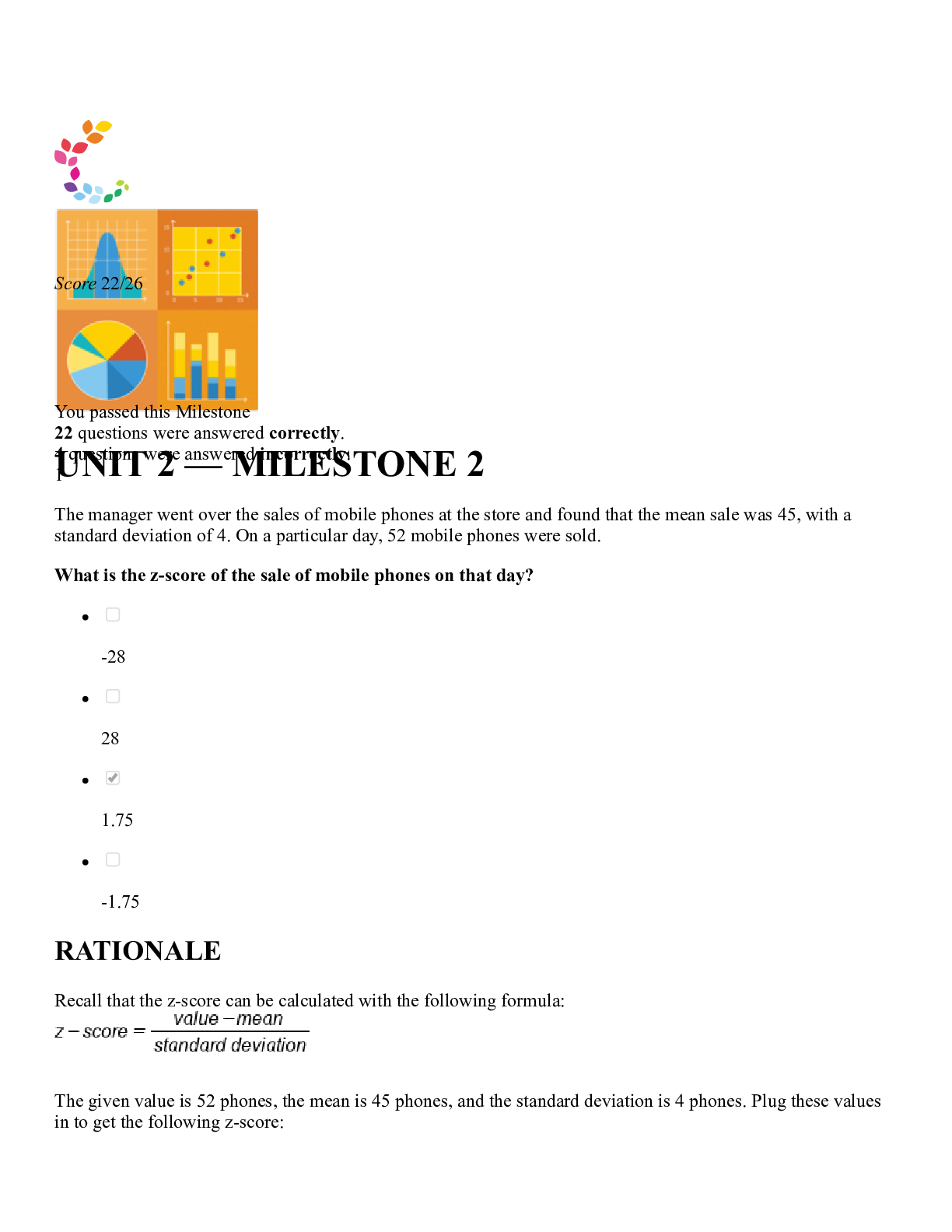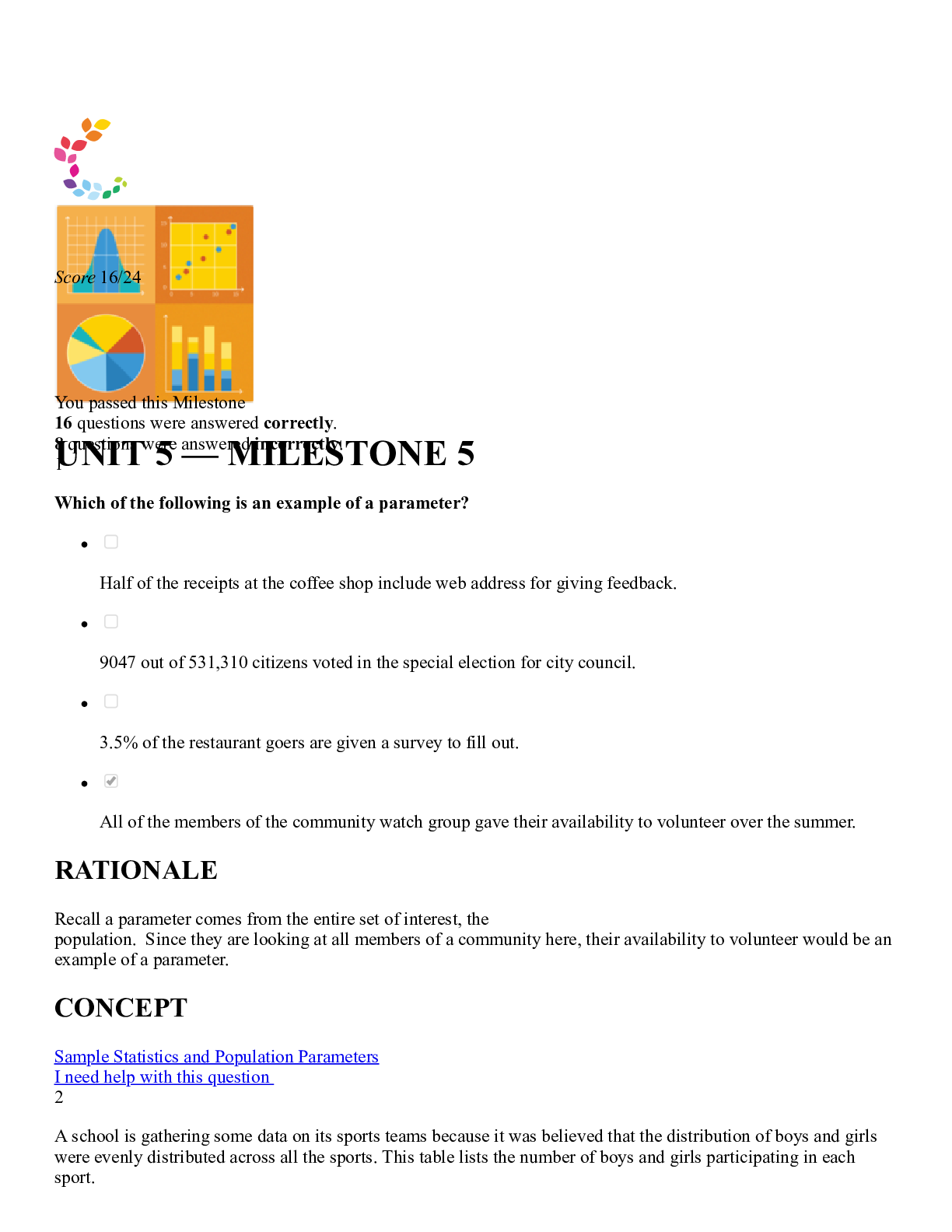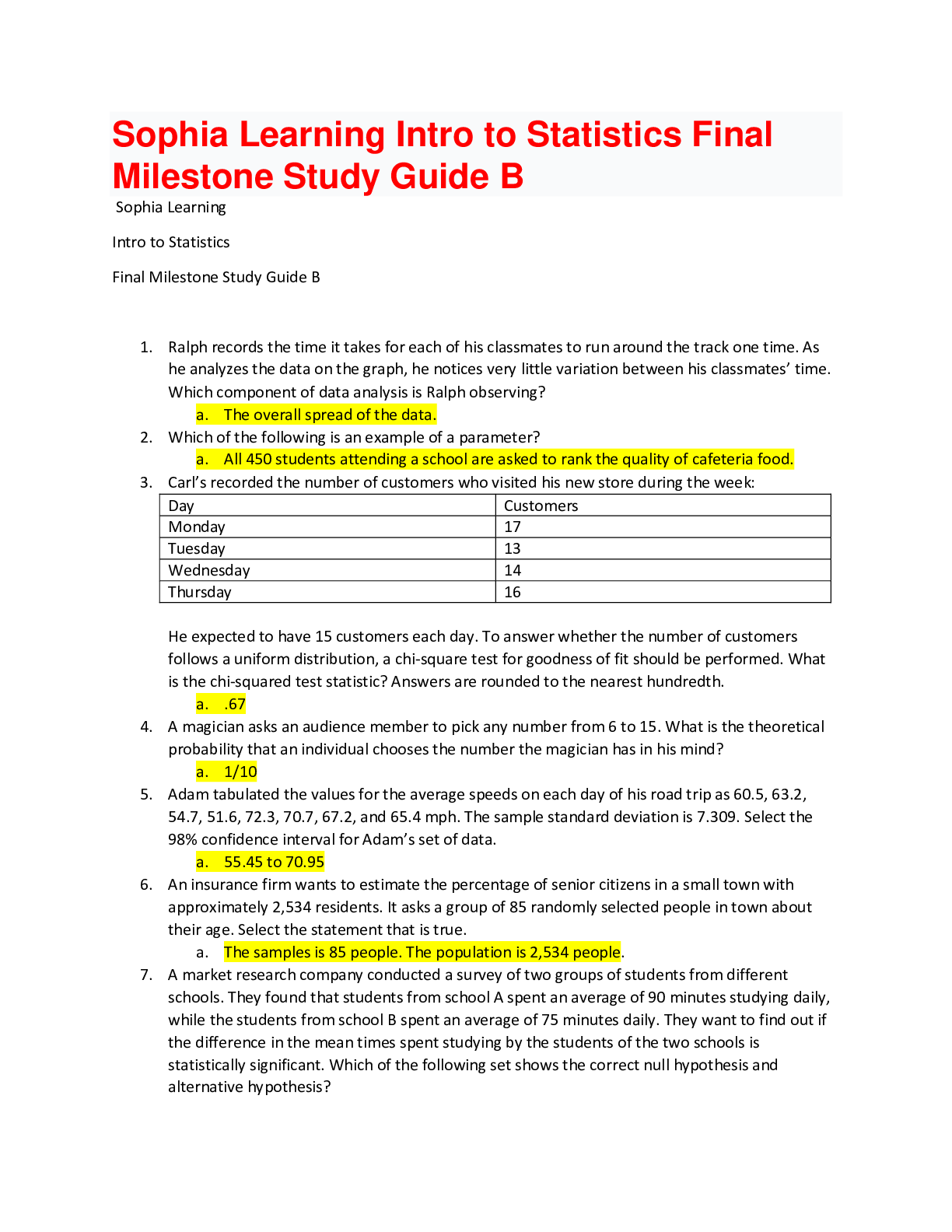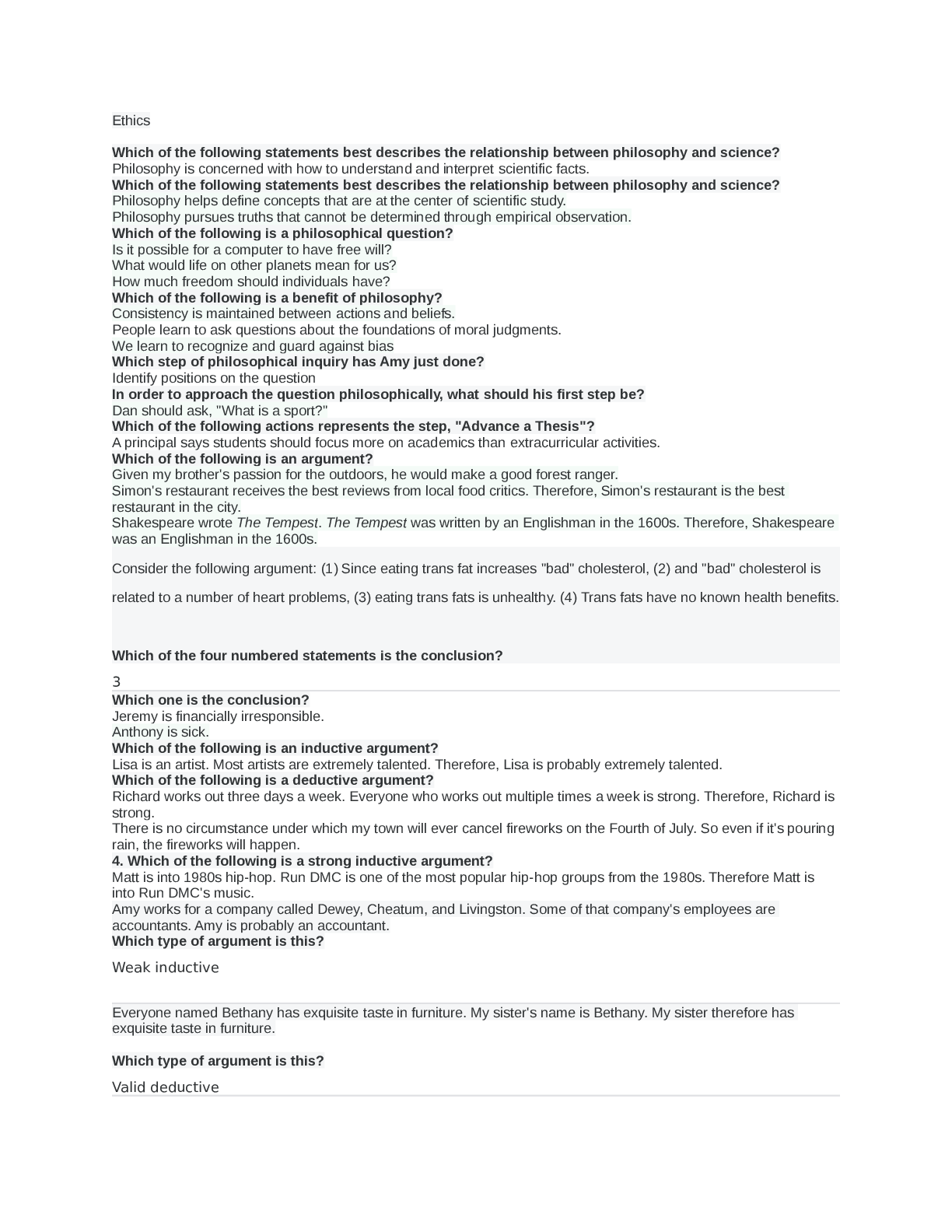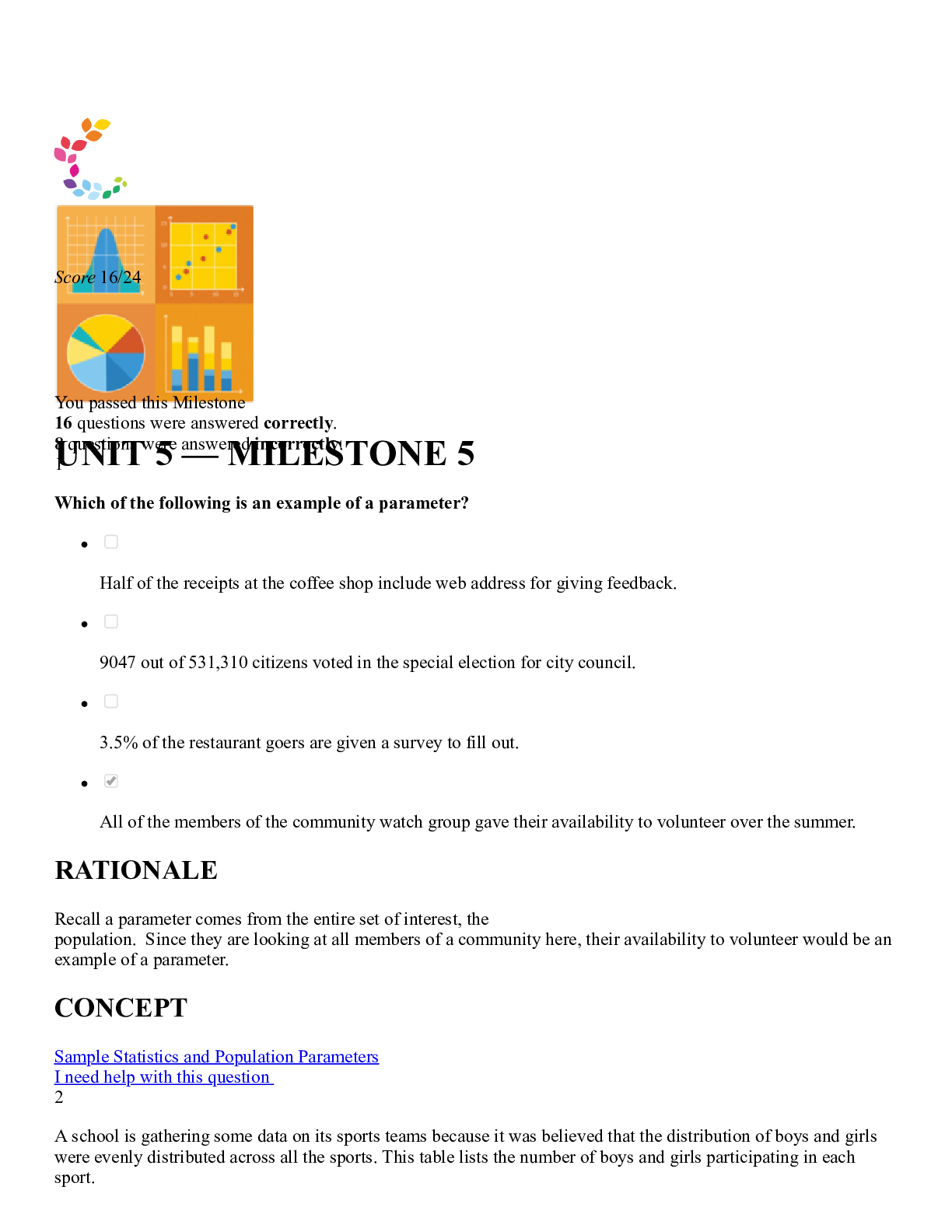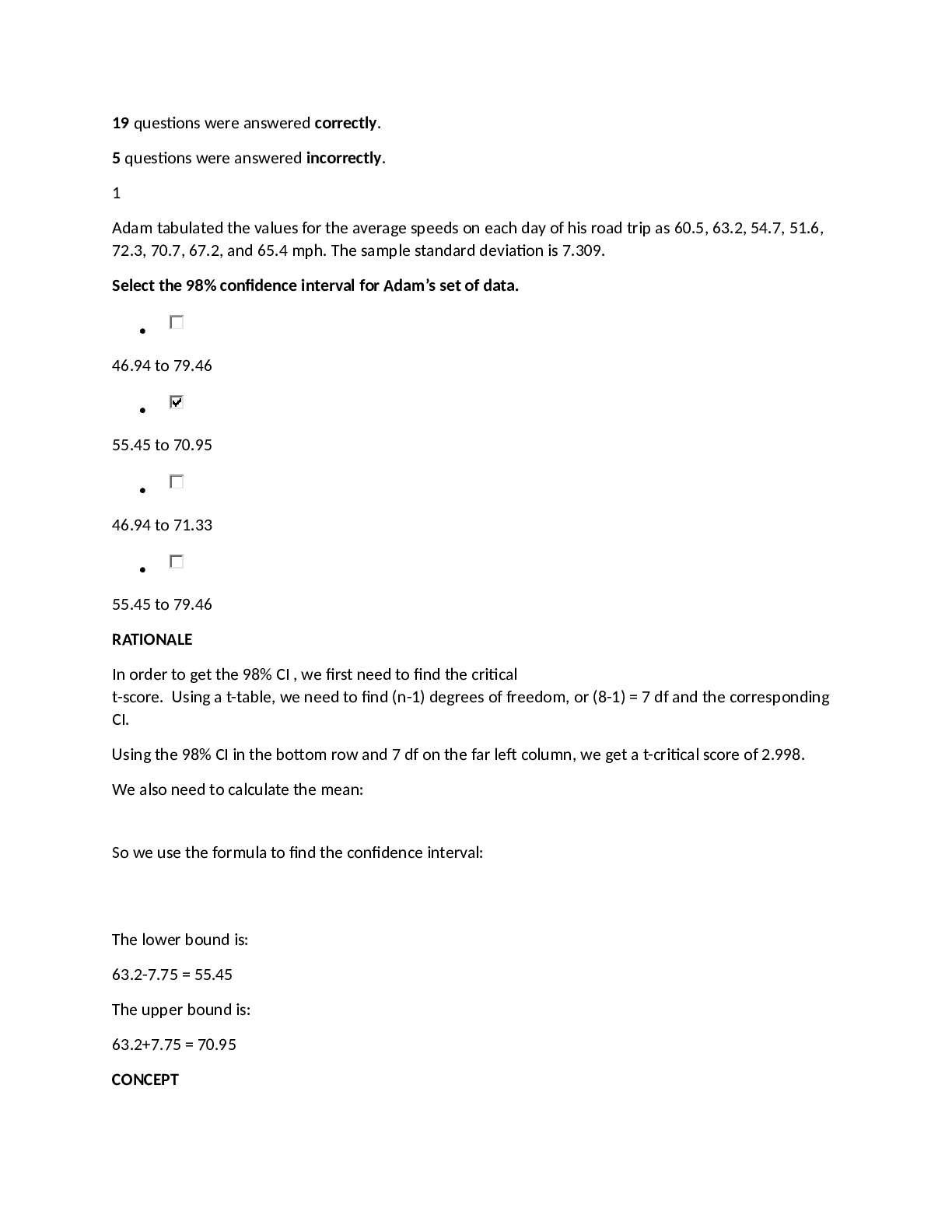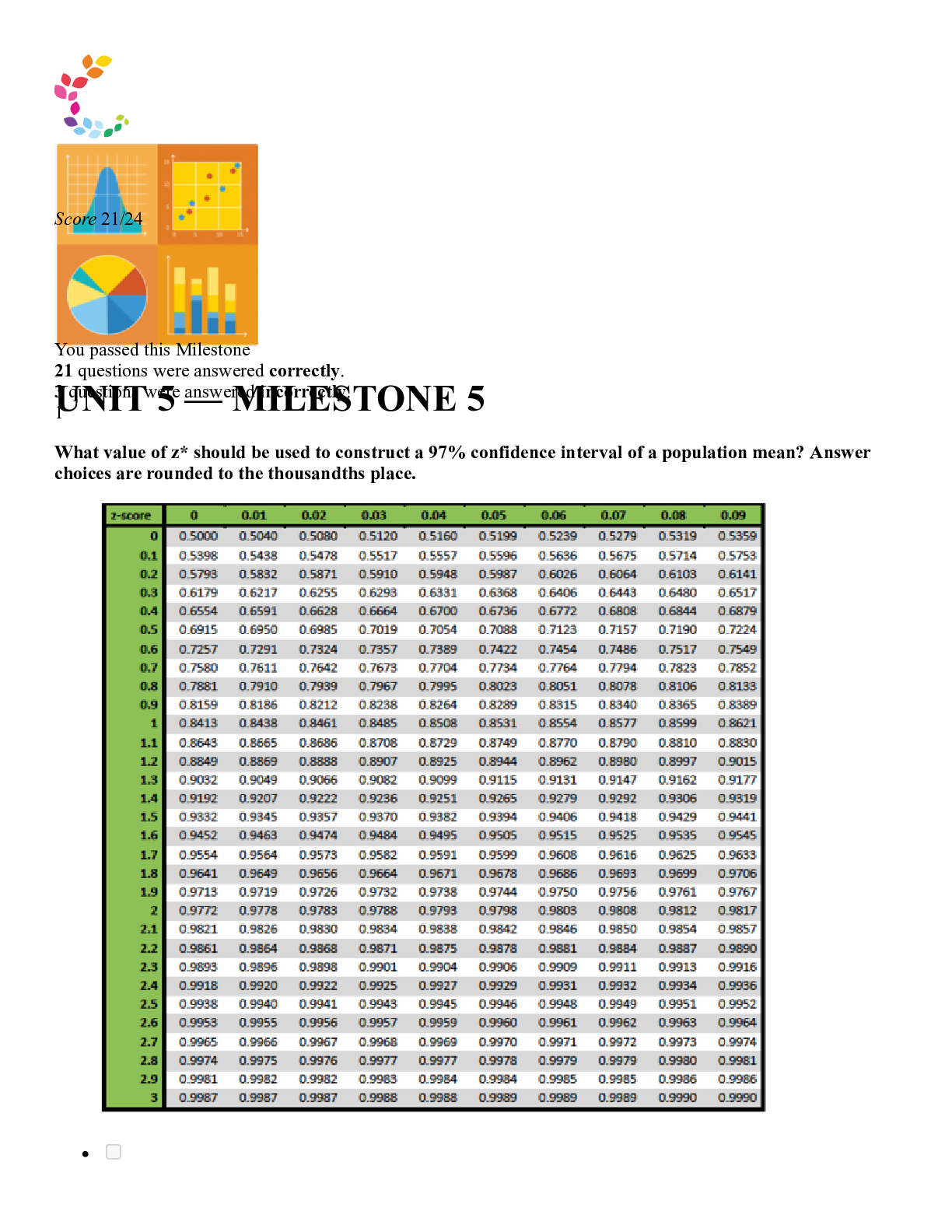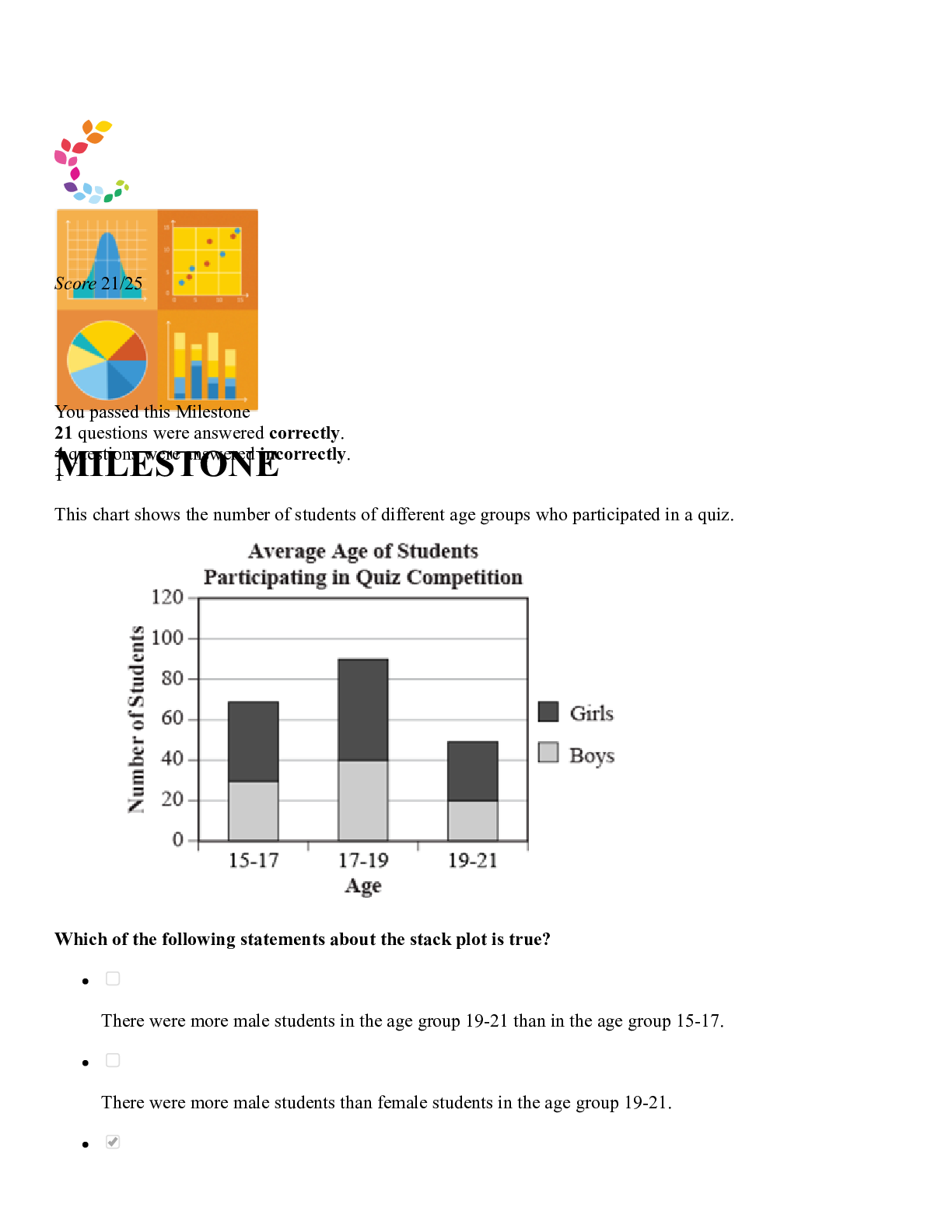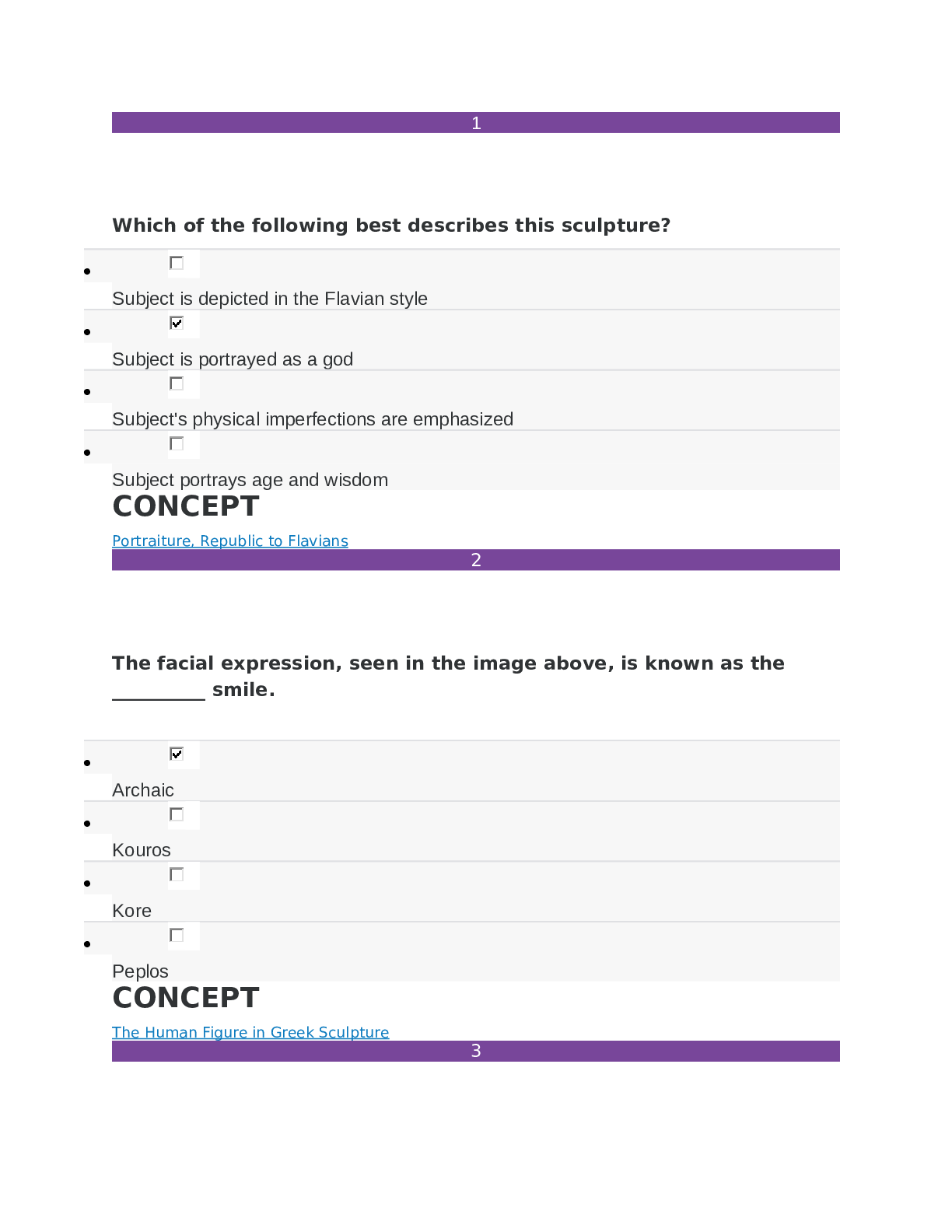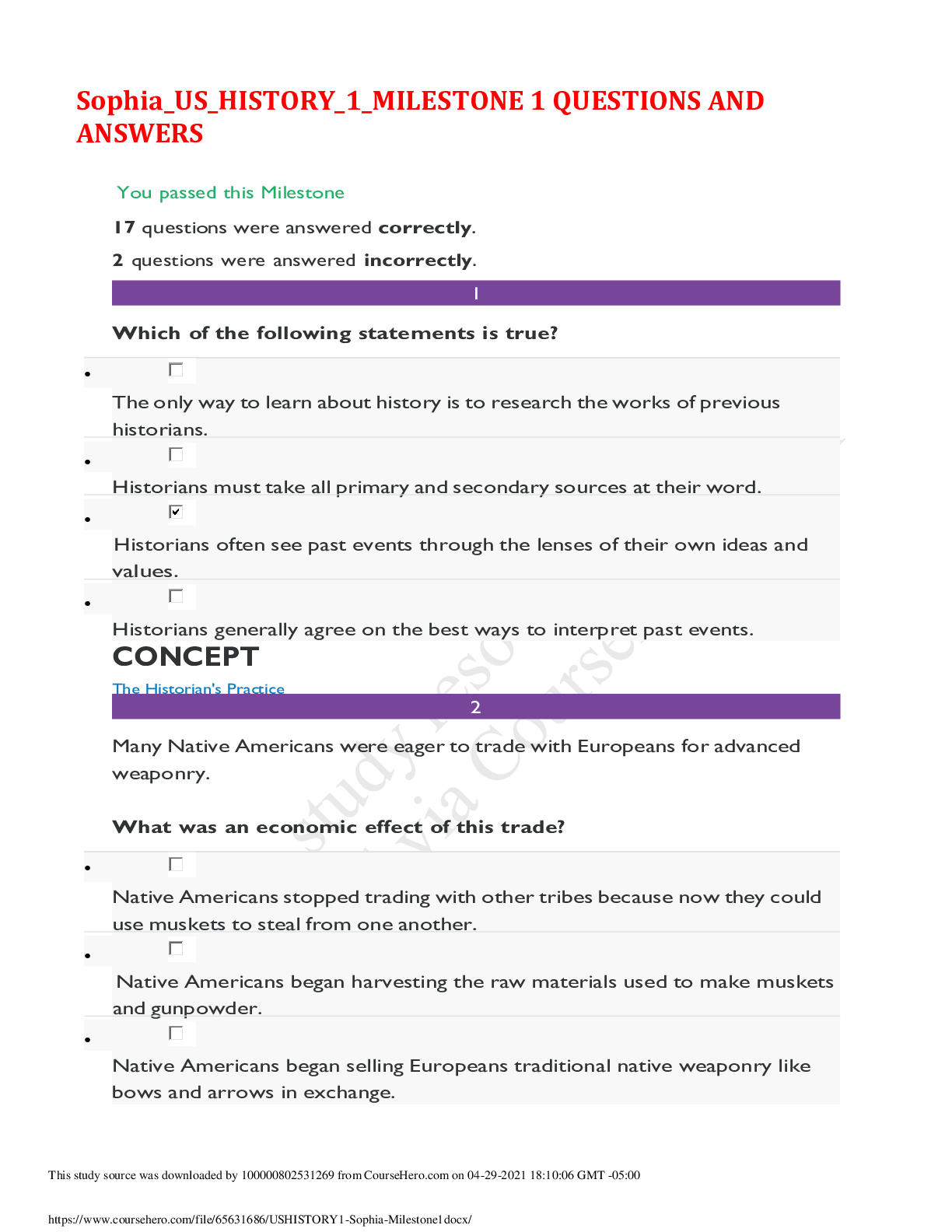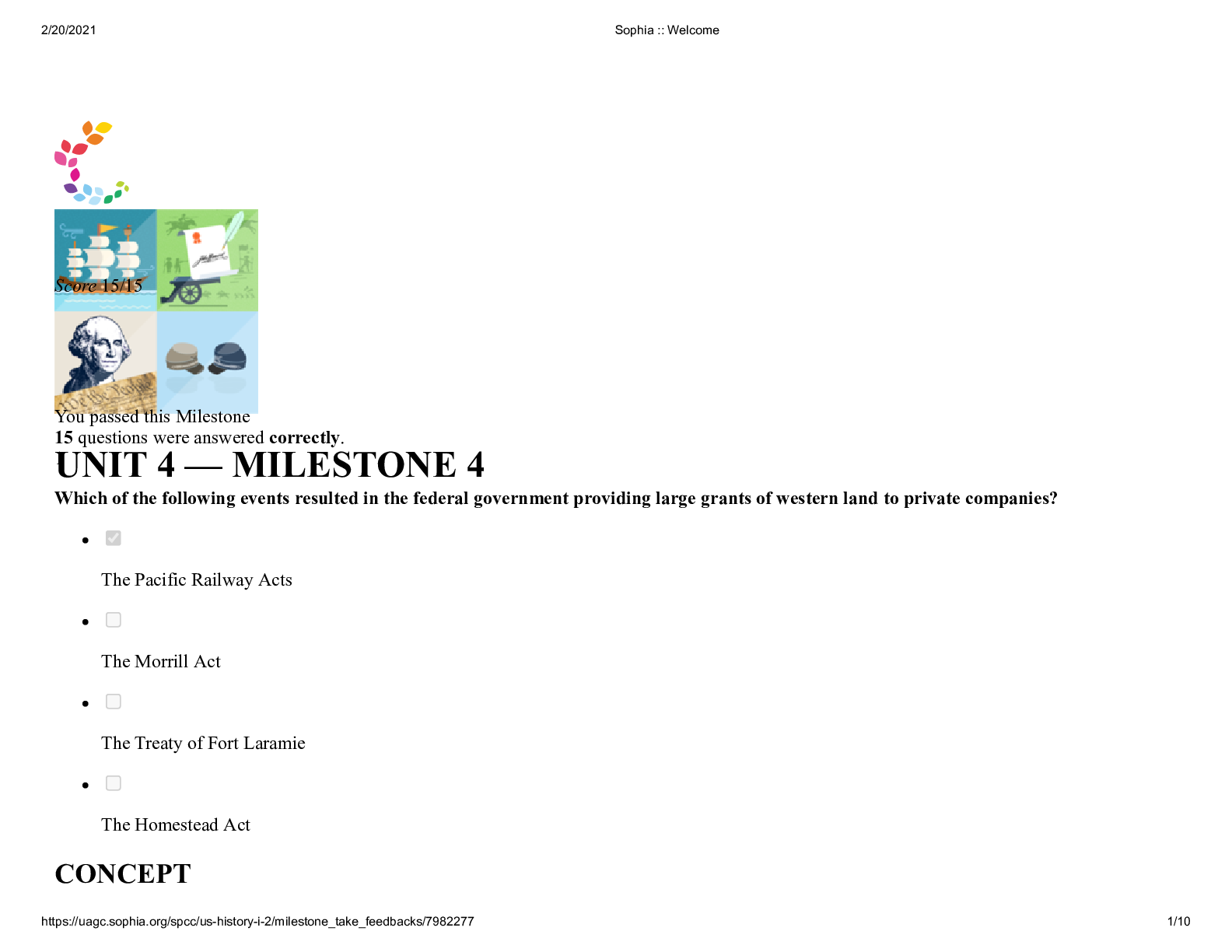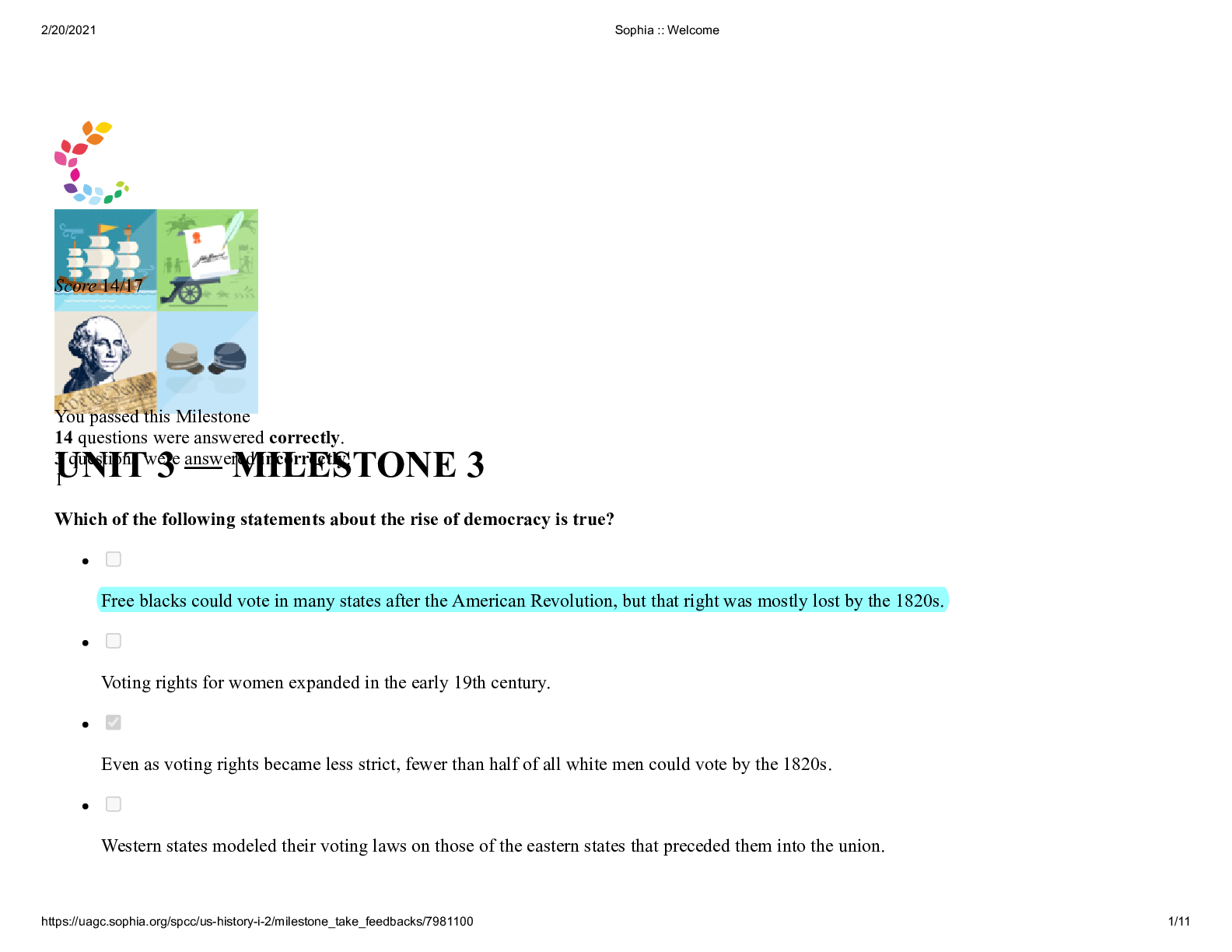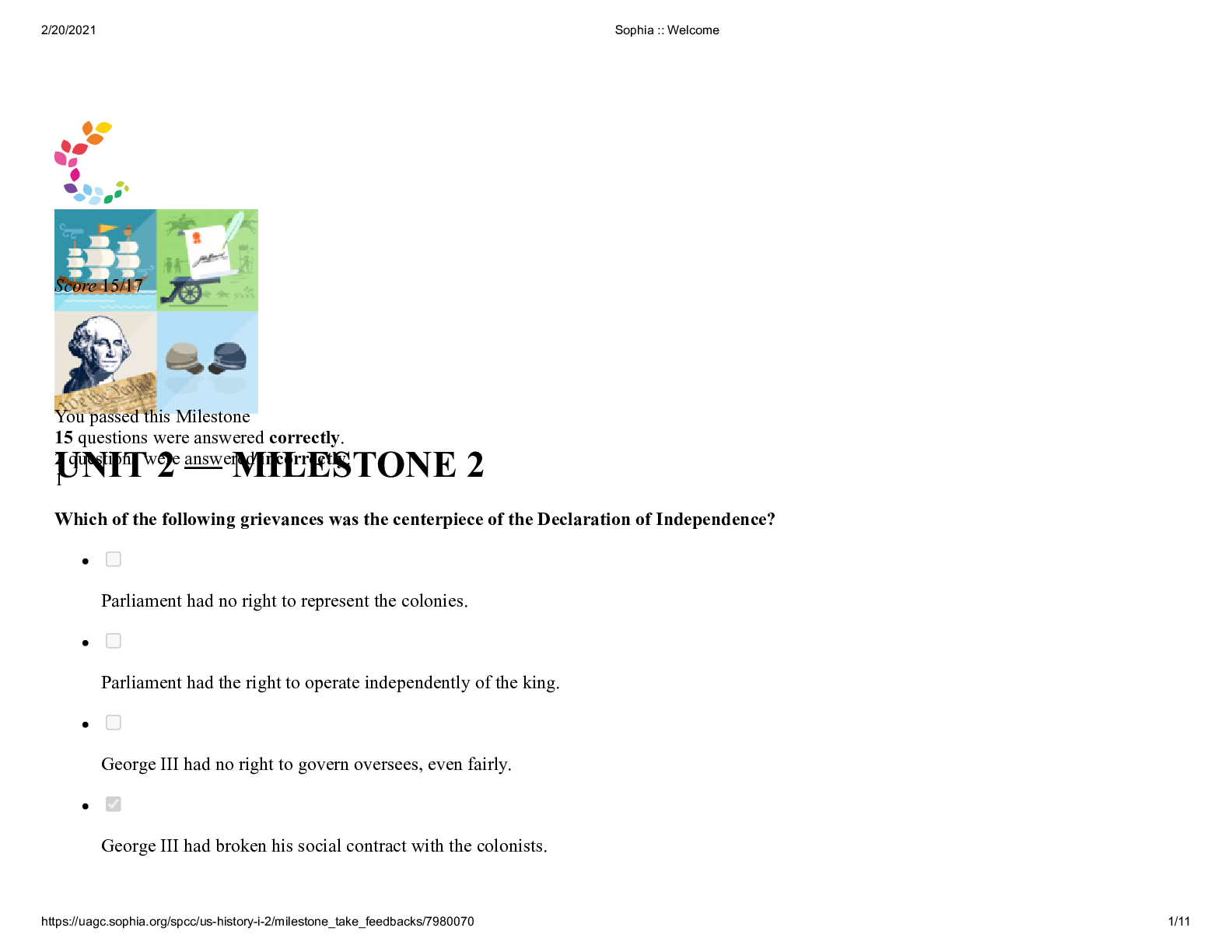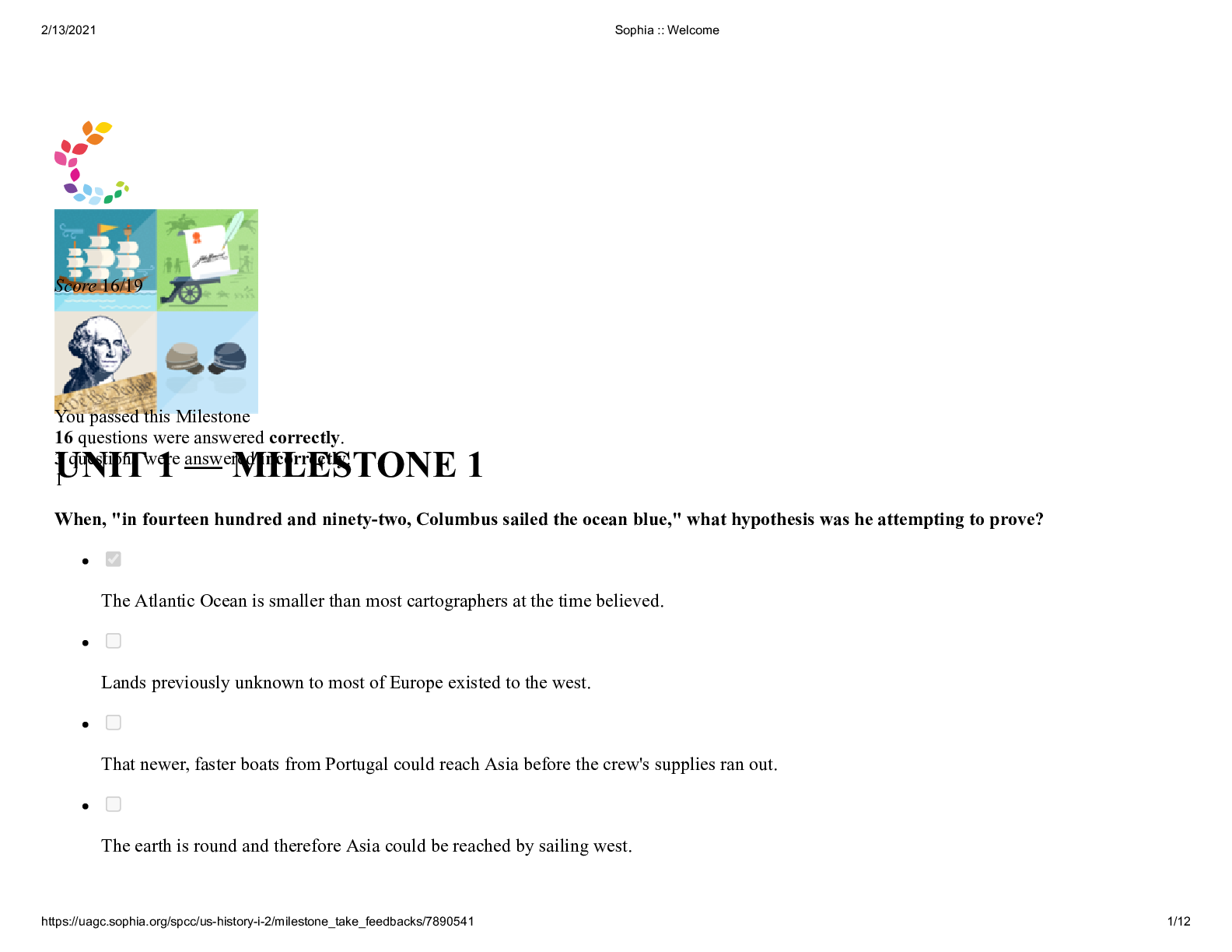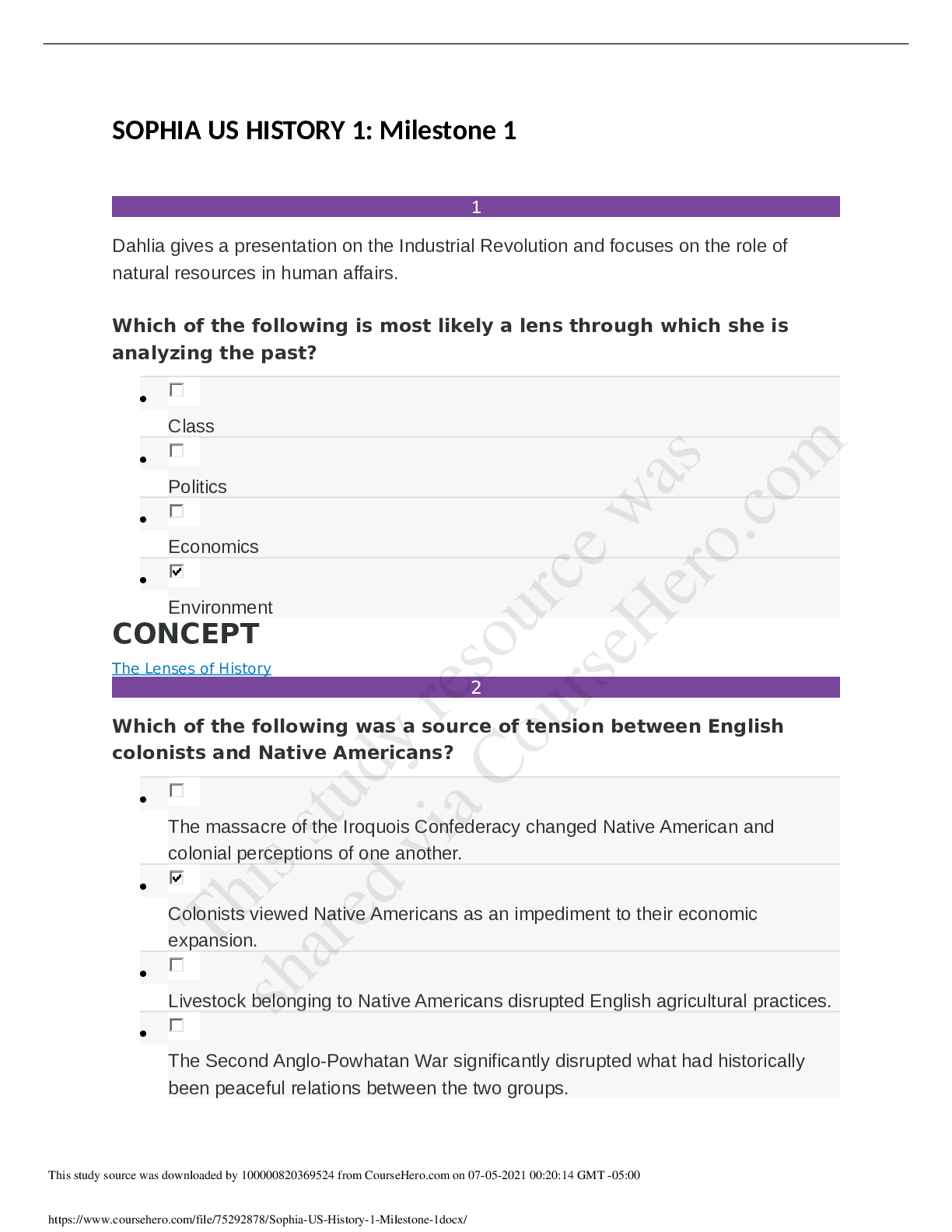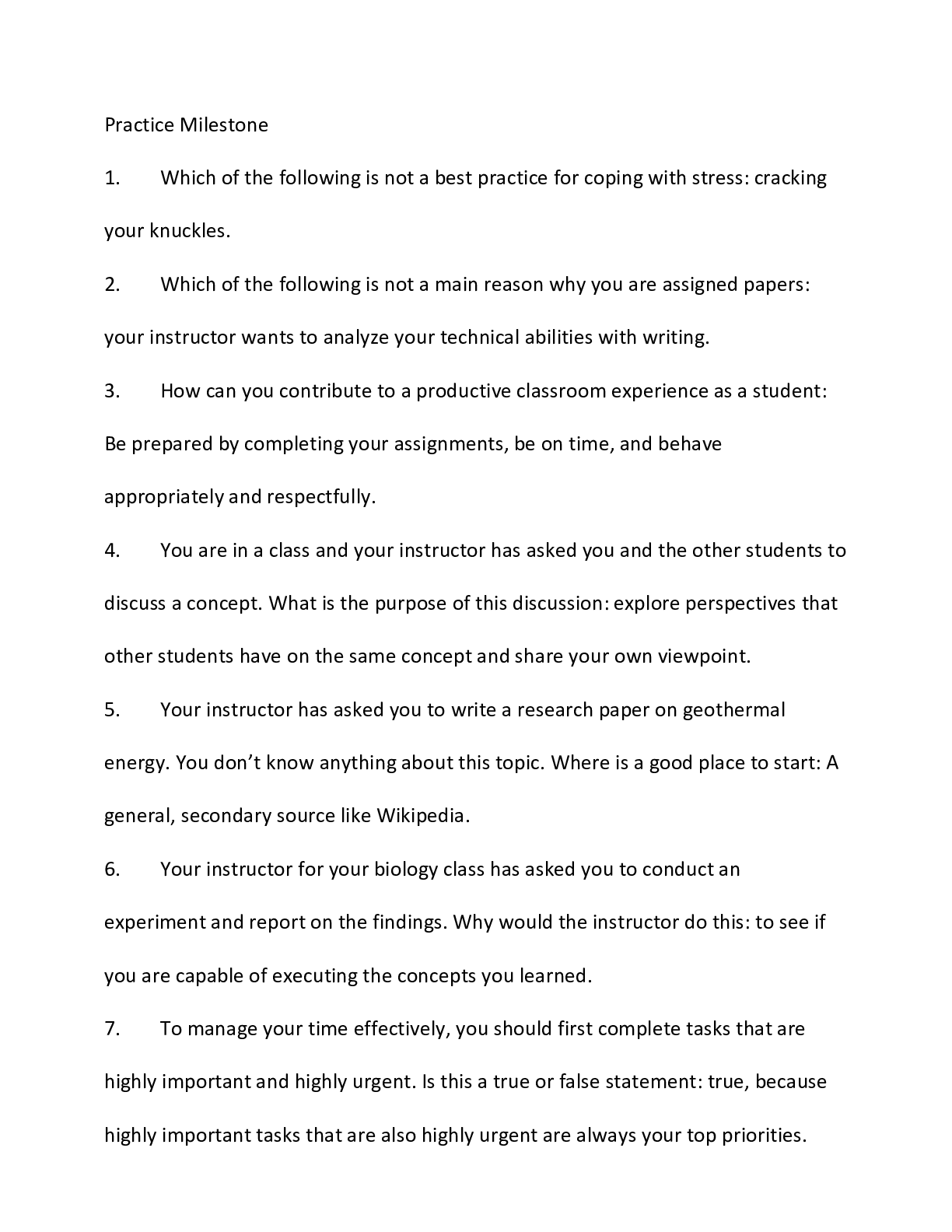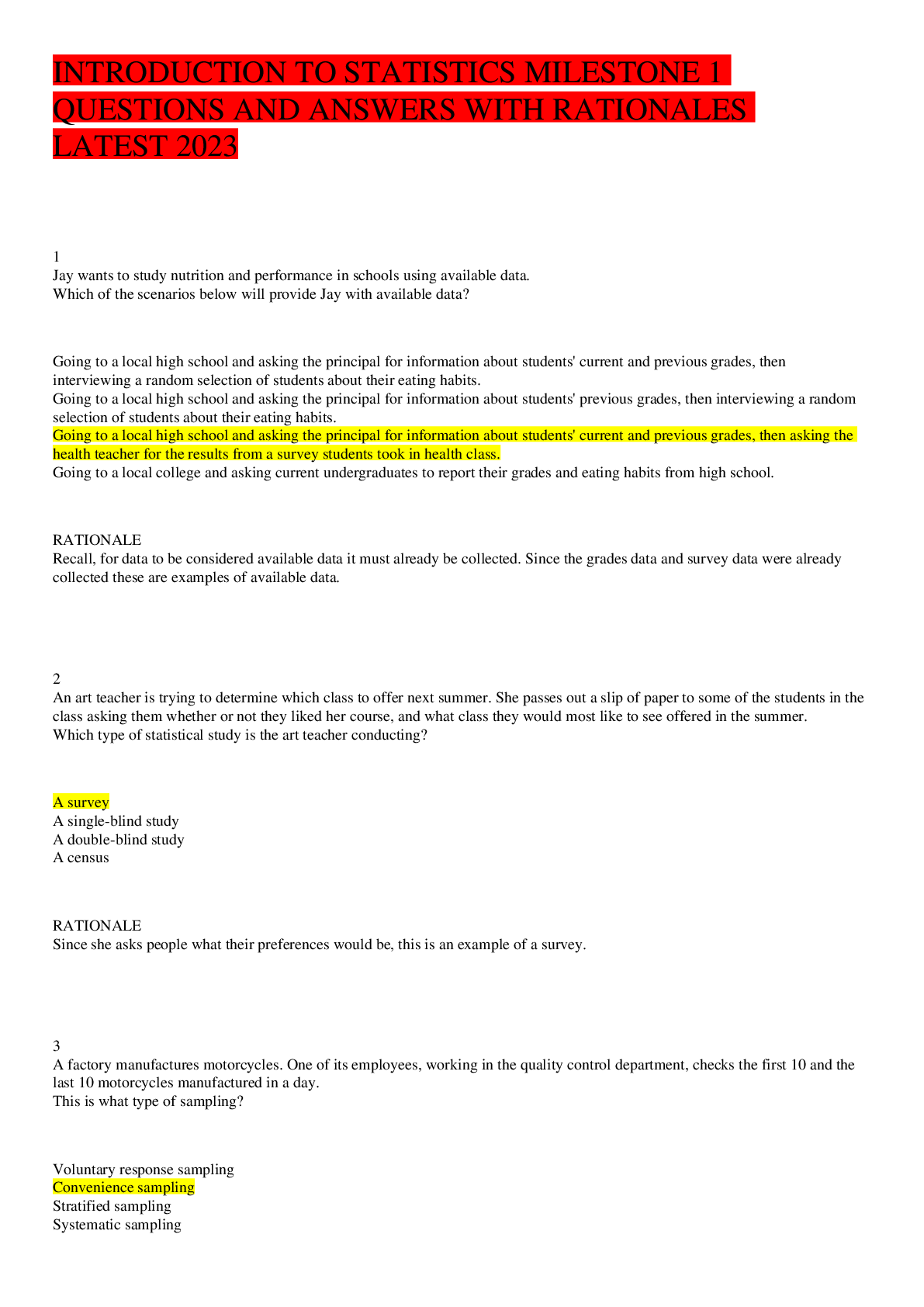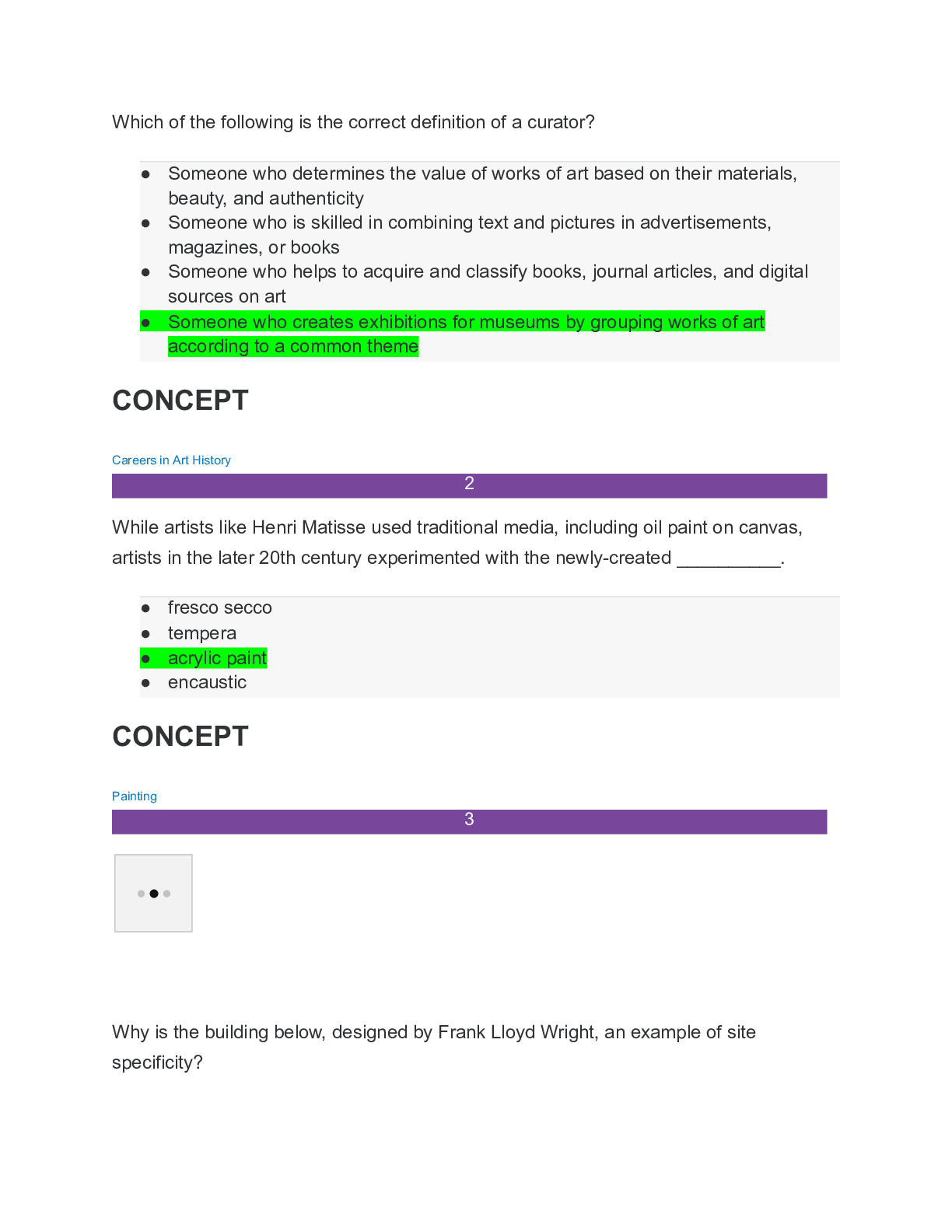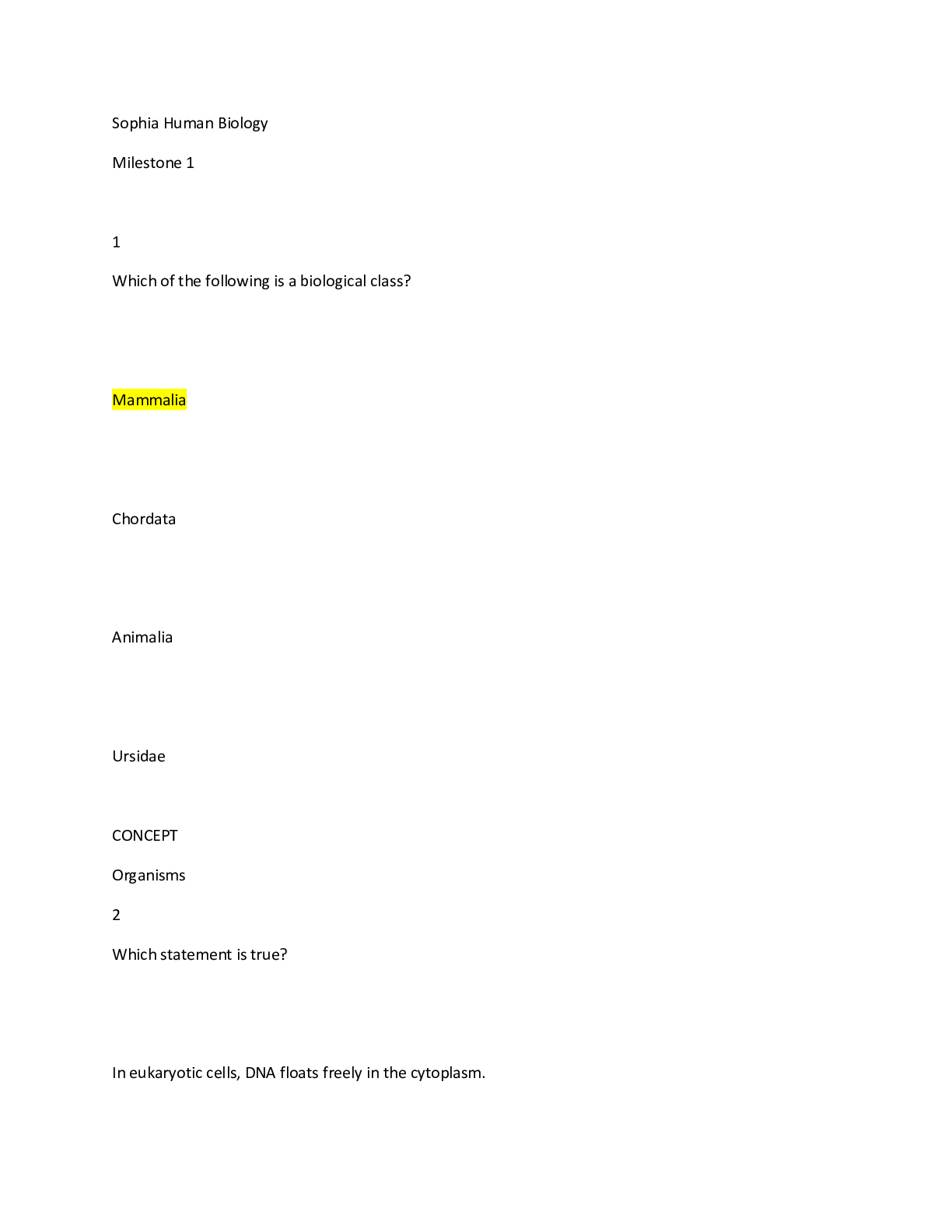History > SOPHIA Milestone > Sophia US History 1 Milestone 1 Questions And Answers (All)
Sophia US History 1 Milestone 1 Questions And Answers
Document Content and Description Below
Sophia US History 1 Milestone 1 1 Choose the statement that best describes slavery before it was racialized. • Slavery was often a temporary condition and the result of debt, warfare or famine... . • Slavery was well-known in Africa throughout history but not in other parts of the world. • Slavery was limited to religious groups who enslaved other religious groups. • Before slavery was racialized, it was uncommon for slaves to become part of the family. CONCEPT African Society and Slavery 2 Why did it take the New York colonists nearly 20 years to establish a legislature? • The Duke of York controlled the colony and didn't care to listen to colonists. • The colonists wished to prove that they could be successful without a strong government. • New York was still under the direct control of the English Crown and Parliament. • The colonists were too divided among themselves to establish a central government. CONCEPT Settling the Middle Colonies 3 Which of the following statements is true? • Historians include all related information in the stories they tell. • Memorizing facts is only one element of being a historian. • After research, the historian presents the facts exactly as they were found. • A historian's goal is to discover the one correct way of understanding past events. CONCEPT The Historian's Practice 4 Which native civilization used a system of knotted threads to record and communicate information? • The Inca • The Aztec • The Hopewell • The Pueblo CONCEPT The First Settlers 5 You skipped this question and it was marked incorrect. "What involvement did women have in the antislavery movement in 1800s America?" Consider the above research question and choose the secondary source that is best suited to answer it. • An encyclopedia entry that provides details about slavery in the United States • A speech given by an American female antislavery activist in 1852 • A book about the 19th century antislavery movement published this year by a historian • An encyclopedia entry that provides details about slavery in the United States CONCEPT Analyzing Primary Sources 6 Many Native Americans were eager to trade with Europeans for advanced weaponry. What was an economic effect of this trade? • Native Americans began selling Europeans traditional native weaponry like bows and arrows in exchange. • Native Americans stopped trading with other tribes because now they could use muskets to steal from one another. • Native Americans began to hunt more beavers so they could trade the pelts for muskets. • Native Americans began harvesting the raw materials used to make muskets and gunpowder. CONCEPT Native American Interactions with Europeans 7 Which of the following statements reflects the process of commodification? • Merchants established sea routes to meet demand for luxury items. • Europeans profited by bringing tobacco from the New World back to Europe. • The movement of people between Europe and the New World intensified. • European nations competed for access to the New World's resources. CONCEPT The Columbian Exchange 8 You skipped this question and it was marked incorrect. How did French Jesuits encourage the spread of Christianity in the Americas? • By gathering natives into enclosed missions • By living in native villages • By settling large numbers of priests throughout New France • By threatening to kill natives who didn't convert CONCEPT French and Dutch Contact 9 What role did New World exports play in the Triangular Trade? • African slaves were sent to Europe in exchange for goods like sugar, tobacco and cotton. • Organic goods like tobacco were sent back to the specific colony's mother country. • Tobacco was used to lure Africans to the Americas where they would be enslaved. • Textiles, rum and other manufactured goods were sent to Africa in exchange for slaves. CONCEPT The Atlantic World 10 Which of the following statements about governance in the northern colonies is true? • Most adult men had the right to vote, no matter their economic status. • Women were invited to collaborate in the governance of both church and state. • Competing political and religious ideologies were generally tolerated. • A central religious figure served by divine-right and was the highest authority. CONCEPT Settling the Northern Colonies 11 You skipped this question and it was marked incorrect. Which of the following historians is collecting oral history? • Katie goes to a museum to see actual weapons and tools used in the Civil War. • Kayla reads news articles that were published in London during the Civil War. • Kenneth copies down his great-grandmother's memories of her family's involvement in the Civil War. • Kevin studies artifacts from the Civil War he discovered digging in his back yard. CONCEPT Think About It: What is History? 12 Which of the following statements best describes the situation in Central America prior to the arrival of Spanish conquistadores? • The Aztec and Inca had been engaged in a centuries-long war for what is now Mexico City. • Many native peoples resented the Aztec rulers and were ready to rebel. • Native cultures like the Aztec and Tlaxcalan were content to coexist peacefully. • The Aztec were a nomadic people, thinly spread through what is now Mexico. CONCEPT Spanish Contact 13 You skipped this question and it was marked incorrect. Which of the following was a source of tension between English colonists and Native Americans? • Livestock belonging to Native Americans disrupted English agricultural practices. • The Second Anglo-Powhatan War significantly disrupted what had historically been peaceful relations between the two groups. • Colonists viewed Native Americans as an impediment to their economic expansion. • The massacre of the Iroquois Confederacy changed Native American and colonial perceptions of one another. CONCEPT English and Native American Conflict 14 In what way did the Crusades start a chain of events that led to European discovery of the New World? • They led to increased movement between Europe and Asia that resulted in new trade networks. • They facilitated an intellectual exchange with cultures that already knew about the New World. • They caused Europeans to give up efforts at conquering Asia and look for new lands to conquer in the west. • They blocked trade routes between Europe and Asia and prevented silks and spices from reaching Europe. CONCEPT Maritime Exploration 15 "If the natives do not submit to our total and absolute authority, we will destroy them and take their lands." The above statement is most representative of which group of European explorers? • French • English • Spanish • Dutch CONCEPT Think About It: How Did Europeans Justify Colonization of the New World? 16 Which factor initially prevented England from establishing permanent colonies in the Americas? • English citizens were too afraid to go to the Americas after the settlement at Roanoke disappeared. • The government was more concerned with religious and political disputes than with sponsoring colonization of the Americas. • England didn't want to risk war with Spain, which already controlled much of the Americas. • Religious tensions spilled over into the Americas, which led many to wait until they settled down. CONCEPT English Contact 17 Which English colony was founded in 1634 as a second source of tobacco production with a charter from King Charles I? • Pennsylvania • Maryland • Massachusetts Bay • Jamestown CONCEPT The English Colonial Experiment: Virginia and Massachusetts 18 Ephraim gives a presentation on the Vietnam War and how it changed the way war is depicted in movies, television and images. Which of the following is most likely a lens with which he is analyzing the past? • Technology • Culture • Economics • Race CONCEPT The Lenses of History 19 You skipped this question and it was marked incorrect. According to Robert Beverley, how did 17th century Virginians distinguish between servants and slaves? • Servants had a right to vote and be elected to political office, but slaves did not. • Servants were freed after a period of some years, whereas slaves were forced to serve for life. • They were distinguished by where they worked: servants indoors and slaves in the fields. • Female slaves could not be subjected to hard labor, but female servants could. CONCEPT Settling the Southern Colonies [Show More]
Last updated: 1 month ago
Preview 1 out of 9 pages
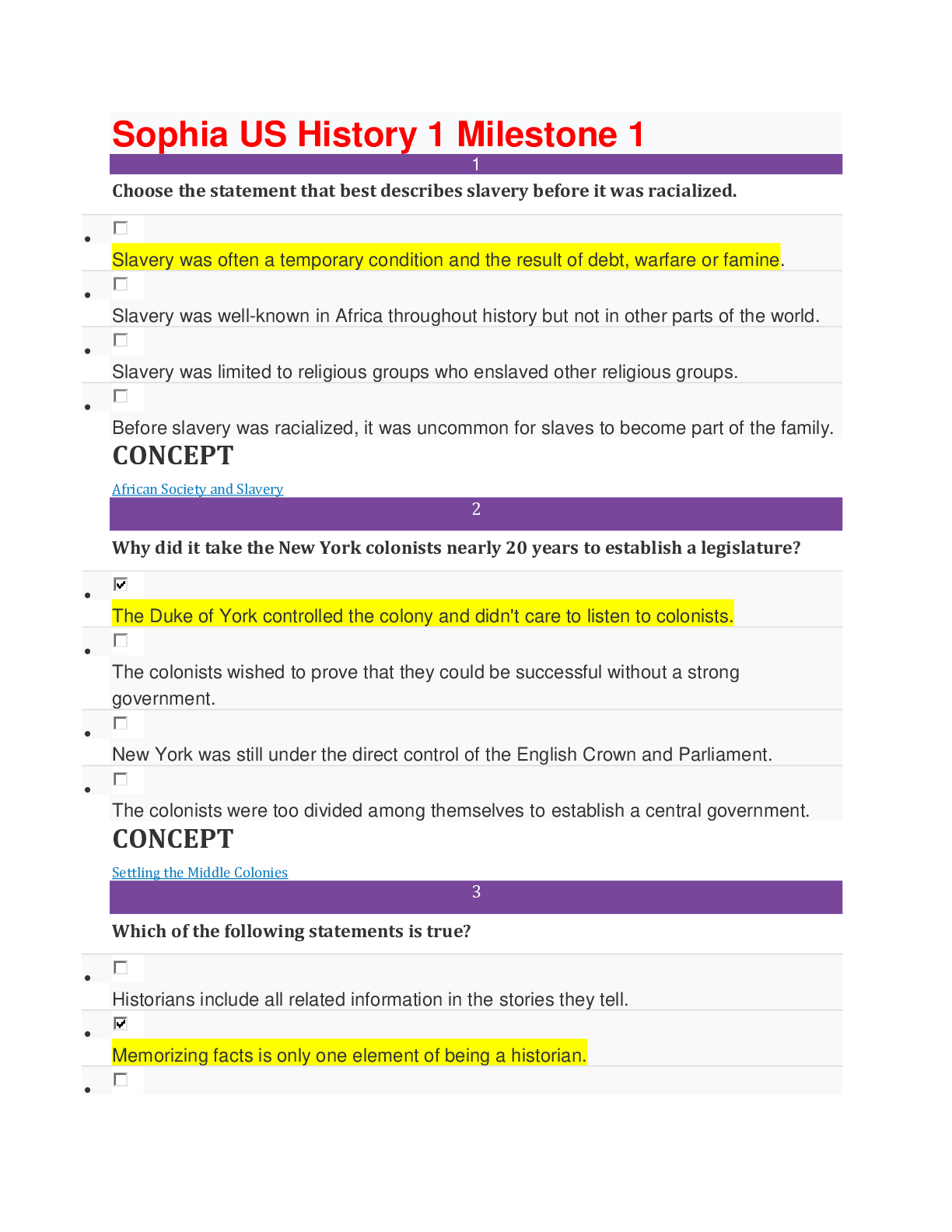
Reviews( 2 )

by CShaw · 3 years ago
wow great and thank you by Good grade. 3 years ago

by Good grade · 3 years ago
Document information
Connected school, study & course
About the document
Uploaded On
Sep 06, 2020
Number of pages
9
Written in
Additional information
This document has been written for:
Uploaded
Sep 06, 2020
Downloads
7
Views
869

.png)
.png)
